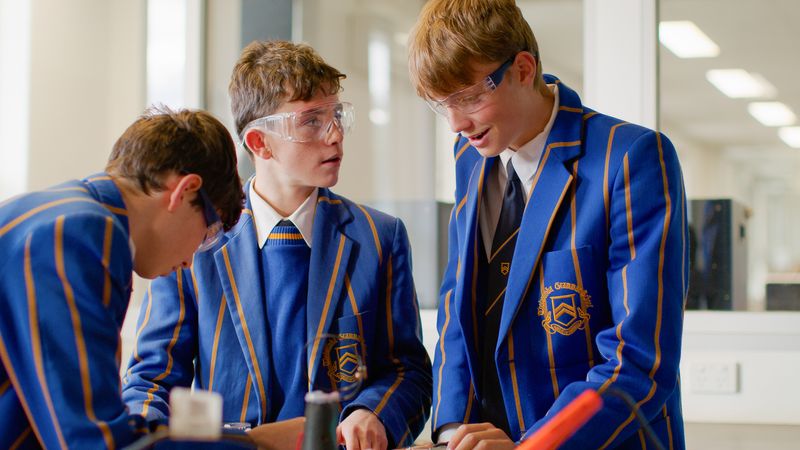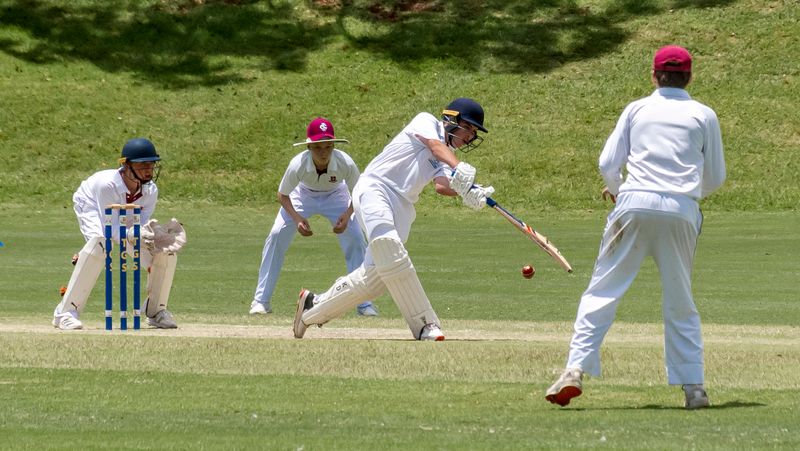“Many of the respondents spoke of controlling the controllables across six broad themes: Consistency and Routine, Using Study Tools, Environment Control, Intrinsic Motivation, Resilience and Perspective.”Mrs Crystal Hede, Director of Learning and Innovation

Giving students the opportunity to cope with disappointment has the capacity to shape their good character.
Schools are inherently hopeful and happy places. Their natural focus on growth, connectedness and preparing youth for a better future creates an optimistic atmosphere in which ambitions are born. These positive emotions and experiences lay the foundation for our expectations and while these can be highly motivating, they come with a catch: the greater our expectations, the greater the disappointments, too.
Disappointment is not a popular feeling. Rightly so, not many of us wish to feel sad, displeased or frustrated by the non-fulfilment of our hopes or expectations. However, in an academic setting, disappointments are inevitable and they can manifest in various forms. Commonly, students can find it hard to understand a concept that they see their peers comprehending and receive a lower-than-desired assessment result. Even worse, they can feel “robbed” of a grade that they believed to be rightfully theirs, not be with their preferred teacher, fall short of the required points for an academic award and face unexpected obstacles that disrupt their learning. Invariably, students will experience one or more of these things at some point in their schooling, possibly all of them, often.

For parents, it can be incredibly difficult to watch our children experience these things, especially when they result in further negative emotions such as shame or self-loathing. Sometimes, the worry we feel for our children is almost unbearable and it is natural to want to fix the problem for them. Prominent clinical psychologist, Dr Judith Locke is a leading voice on this topic. In her article, Kids need to fail. And parents need to let them; she says, “When your child is disappointed, it’s understandable you want them to feel better immediately, but taking temporary bad feelings away makes your child less capable to face inevitable trickiness in the future.” Locke goes on to say, “While I know it feels awful to watch your child be disappointed or sad, every time you help them avoid those feelings, you also sidestep them learning essential skills of resilience and a belief they will cope if life doesn’t always go their way.”

For these reasons, we will not shield students from experiencing disappointment at TGS. Doing so would be detrimental to their development and this fails to prepare them for the realities of life. Most importantly, giving students the opportunity to cope with disappointment has the capacity to shape their good character. As beautifully put by Irish politician Sir Boyle Roche, “Disappointment is the nurse of wisdom.”
I sought the wisdom of some of our older TGS students who have learned to manage their disappointments over time and even harness them for good. Specifically, I surveyed recipients of diligence awards because these recognise dedication and resilience rather than grades. All the respondents admitted to encountering setbacks and shared various versions of not letting these deter their efforts. One of the seniors said, “When faced with disappointment, I use ‘failure’ as a motivator to strive for improvement and apply the feedback I receive to make adjustments for the future.”
- Consistency and Routine: Diligent students emphasised the importance of sticking to a structured study schedule. They often study at the same time every day and for consistent durations to build a habit of regular learning.
- Using Study Tools: Many of these students use study trackers, whiteboards and diaries to reinforce learning and ensure they systematically cover all necessary material.
- Environment Control: They create and maintain separate spaces for study and relaxation to condition their minds for productive work when in the study zone. This includes removing any electronic devices from the study area.
- Intrinsic Motivation: Consistently, the diligent students spoke of a strong internal drive to improve and put in the effort required to overcome academic hurdles. This includes proactively seeking clarification or help.
- Resilience: Their responses demonstrated resilience in the form of a “bounce back” mentality. They spoke of accepting that not all decisions will be to their liking (for example, class allocations), acknowledging their negative emotions and then moving on in order to stay focused on their learning.
- Perspective: Maturely, some of the boys spoke about managing their expectations. While hopes and dreams can be powerful motivators, it’s important to balance them with realistic expectations to maintain a healthy mindset.
TGS Old Boy (2011-13) and 2024 Paris Olympic medalist, Matthew Denny recently spoke with our students, sharing some anecdotes and advice that aligned with the above sentiments. He said that one of the biggest things he learned from his career was that “Success lies on the other side of discomfort. You just need to step toward it and keep moving.” Matthew’s wise words support the notion that disappointment — a form of discomfort — is a natural and expected part of life that forms our character as we strive towards our goals and aspirations. With this in mind, our TGS boys need to keep dreaming but expect that disappointment will occur. They need to keep moving and trying and see disappointment as an opportunity for learning.
Reference
Locke, J. (2019, March). Kids need to fail. And parents need to let them. The Courier Mail. Retrieved September, 2024, from https://www.couriermail.com.au/rendezview/kids-need-to-fail-and-parents-need-to-let-them/news-story/5df007cfd72f50b4a22b03c39c127781
Latest Blog
We See You - Mitchell Wilkes
That was the heart-wrenching diagnosis for Year 10 student, Mitchell Wilkes, right on Christmas in 2021. Mitchell’s mum noticed he wasn’t reading properly and had a gut feeling that there was something wrong with his eyesight. A trip to the optometrist revealed a thinning in the retina, and further tests showed that Mitchell had a genetic condition called Stargardt Disease, a juvenile macular degeneration illness that results in slow central vision loss.
Correcting our School's official record commemorating World War I and World War II
On the eve of our 150th year, we're calling on the School's alumni, parents, past parents and greater community to aid us in correcting the record of our involvement in two watershed geopolitical events of the 20th century. For the last four years Toowoomba Grammar School Museum Volunteers, Mrs Ann Hallam and Mrs Sue Palmer, have been updating the School records on Old Boys, staff and Trustees for the World War I and World War II theatres of war. Over the years several staff and volunteers have…
A Pioneering Woman of TGS
My late husband was a teacher, and our four children are all teachers, which we encouraged them to do because it is the best job in the world. It’s hard to believe I’ve been here for 36 years, working under four Headmasters: Mr Bill Dent, Mr Hugh Rose, Mr Peter Hauser and now Dr John Kinniburgh. I still drive into the School each day and smile, looking at the beautiful place it is — magnificent ovals, gracious trees and historically significant buildings. It is difficult to express the…
NZ Rugby Tour success, more than winning matches across the Ditch
The teams were undefeated and it was a trip the players will never forget. This tour was years in the making and heralds a new era of touring and hosting different rugby schools to give our players opportunities for growth as athletes and as people. Head of Sport - Rugby, Mr Lincoln Clapham, explained they selected 46 students to take part in the ten-day tour and began training last year. From Term 1 onwards, the squad trained twice weekly on the oval plus two and sometimes three gym sessions…
Aussie Teen Reading Habits Revealed
I was recently sent an article, summarising some research from Deakin University around the reading habits of teens in 2024. Some of it was, as the title suggests, surprising. Some was not. However, all of it was built around the importance of reading, and supporting our teens to read, which is something that every one of us should do. While we tend to see our teens as digital natives, recent research from Deakin University suggests that the average Aussie teen reader would rather flick through…
Now More Than Ever
The one-of-a-kind Indigenous artwork is emblazoned across the shirts for the First IV Tennis team, jerseys for the First XI Football team and First XV Rugby team and First V Basketball team's singlets. National Reconciliation Week is a significant date on the calendar for all Australians, running from Monday, 27 May to Monday, 3 June. The incorporation of this Indigenous design in our uniforms is a significant milestone for our School, especially for our 47 Aboriginal and Torres Strait…
It's a numbers game, making mathematics mainstream
Term 2 has been a busy one in the Mathematics department; from multiple year levels having extended assessment tasks to competitions run inside and outside the School. Using mathematical equations to recreate artwork The Year 11 Mathematical Methods students got a chance to be very creative with their assessment - using numbers to reproduce artwork. The boys visited the 2024 Grammar Art Show in Term 1 and were given the task to reproduce a chosen work using their knowledge of mathematical…
Bucolic beginnings, boarding and becoming a bowel surgeon
Coming from a cattle property near Injune I was in awe of the School’s ovals with lush, green grass and immaculate facilities. I found being able to throw yourself around and not risk skin cuts and grazes quite novel. Sharing the same field where many Old Boys and past heroes trotted was inspirational. I found the comradery among the boarders my most overwhelming memory. It was like having 60 brothers with similar interests all living under the same roof. There was always someone around to kick…
Our Other Mother
Meet Ms Janelle Fletcher, the House Mum of Corfe, whose journey at TGS began back in 1992 as an instrumental music teacher. Her story is one of deep connections, love for the arts and an unshakeable bond with the students of TGS. From the time that Janelle first stepped onto campus and shared her musical talents with young minds to now creating her own “mum moments” in Corfe — she has nurtured a profound sense of community and established connections that have lasted through generations. Her…